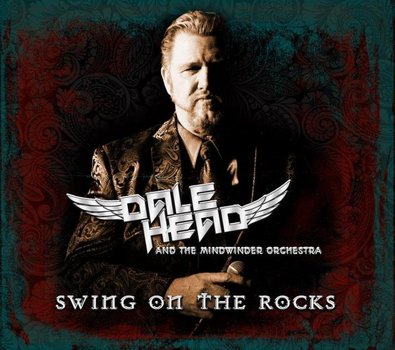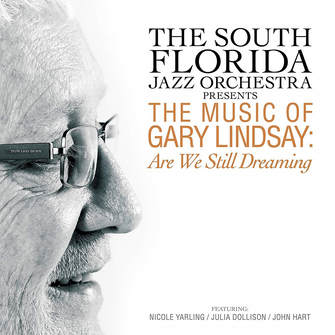
He keeps the big band format on Swing on the Rocks with his Mindwinder Orchestra. The big surprise is the guest appearance of the great Paul Shaffer who told Dale that this album would “blow their minds.” He was correct.
Swing on the Rocks is a sweet title because the album does indeed swing all over these rock tunes from Ted Nugent, Van Halen, the Police, the Eagles, Van Morrison, the Edgar Winter Group, Aerosmith, Paul Simon, and more.
Truth be told, the only one of the above-mentioned that I ever liked at all was Van Morrison. But Dale Head gives these songs a cooler treatment than they ever experienced before and I came to love them all. To keep things honest, Billie Holiday is tossed in beautifully plus we get to experience one terrific Dale Head original.
The album opens with Ted Nugent’s Hey, Baby. Steve Dunne’s guitar and Paul Shaffer’s piano and B3 organ are raw and swinging. All I could think was “But I don’t like Ted Nugent!” Listen to Dunne’s blistering guitar and the power of the horns and tell me you aren’t smiling. Dale himself sings with an audible smile, as well. He knows how to treat a song.
Van Halen’s Little Dreamer never sounded like this. While you may remember David Lee Roth’s original vocals, Dale’s delivery is so much cooler, so much Jazzier. So much more swing. Chad Quist delivers the great guitar work and the big band pushes the power of the song.
Van Morrison’s Into the Mystic was excellent in the original recording. Dale and the Mindwinder Orchestra keep the original gentle swing and Dale sings the tune with a devoted reverence for the original. Then Dale treats us to a fine flugelhorn solo, beautifully done.
Dale recalls a cognac with Joe Williams in 1985 and was told to “tell the story” of the pieces he chose to perform. He has fulfilled that counsel with dedication and purpose. Maybe this is why Dale’s treatments so often surpass the originals.
Billie Holiday’s God Bless the Child fondly recalls the Blood, Sweat & Tears version. This was such a sweet delivery of such a powerful song. Then the band breaks into a Latin swing with fantastic horn work from Trombone solo: Al Bent and Mike Rinta on trombones, Dave Lyn Scott and Steffen Kuehn on trumpets, and Alex Murzyn on alto sax. Good Lord, this was fine, fine stuff.
Fiona Apple’s Criminal from 1997 was a strong retelling of Apple’s confessional but replaces the heavy bass and drums drive with an even more driving horn section. This one eats you alive.
Frankenstein is from the Edgar Winter Group’s 1972 album, They Only Come Out at Night. Edgar Winter was a smoking keyboardist but Dale brings in Paul Shaffer and a massive horn section to take Winter’s instrumental to swing town. Jeff Sanford starts off the solos on alto sax, followed by Steffen Kuehn’s trumpet and Erik Hughes on trombone. Things get monstrous with the duel between guitarist Chad Quist and Paul Shafer’s keyboards. Dale steps in with scat as Andy Fraga’s drum work is laying down the thunder. I wish the 15-year-old me had been able to enjoy this version.
Dale Head wrote Paranoia in 1995. There are cool corps progressions and hot solos from Chad Quist and Paul Shaffer. The menacing guitar and the drive of the bass and drum with Dale’s frenetic scat paint a dark image of the mental state. It is one tight tune.
Murder By Numbers comes from the 1983 album Synchronicity. Sting himself said the song was about the evil deeds of politicians. “Murder is the sport of the elected.” The lyrics detail the ease of getting oneself into the mindset of committing murder. Dale delivers the song in a film noir atmosphere with his cool scat and excellent trumpet solo.
Thirteen Women was the 1954 tune originally titled Thirteen Women (and One Man) and was about the dangers of the Hydrogen bomb and survival of only the singer and 13 women. It is presented in melodramatic intensity with baritone saxman Byron Colborn. Dale’s vocals are smartly enunciated in his unique style.
Paul Simon’s Baby Driver appeared on the 1970 Simon and Garfunkel album Bridge Over Troubled Water. The Simon and Garfunkel version was a bit rockabilly but Dale Head gives a more boogie-woogie treatment. And it works. Jeff Sanford and Byron Colborn bounce the sax solos with high energy and great fun. Some cool time changes depict the varying speeds as producer and engineer Andy Greenberg acts as the voice of the race announcer.
Aerosmith’s Walk This Way was a 1975 rocker original and got a hip-hop revision with Run DMC in 1986. Dale brings up the heavy horns to turn it into a funk piece of bone-crushing proportions. Steve Dunne works a great guitar and Dave Bass gives a great piano addition. The horns push the tune relentlessly and Dale seems to be having the time of his life.
Wasted Time from the Eagles follows. Dale is joined in a duet by Jean Fox. What a great choice. She is an excellent partner with Dale and the big band orchestration carries the song so extremely well.
The penultimate song on the album is I Know a Little written by Steve Gaines for the Southern-rock band Lynyrd Skynard in 1977. I couldn’t believe it was the same song. Dale took a simple song and made it a big band aficionado’s delight. It swings and swings hard. “I know a little about love and, baby, I can guess the rest.” Fun stuff.
Rush’s New World Man is brilliantly reworked. It keeps the cool Geddy Lee bass line but the horns get to carry melody and Dale gives the vocals a straight-up delivery. The song opens with a NASA transmission of the Apollo 11 flight and closes with the same. For a space egg-head like me, it was the coolest possible way to open and close the piece. Also an excellent way to close the album.
Dale Head never disappoints. Whether he is reworking Jazz standards or rock and pop tunes, he makes them swing and breathes his own life and will into the songs—often giving a different or expanded message for the time and space that we occupy. He turns the big band format into a Greek chorus of our modern drama. All done with a smile and a wink.
~Travis Rogers, Jr. is The Jazz Owl

 RSS Feed
RSS Feed
